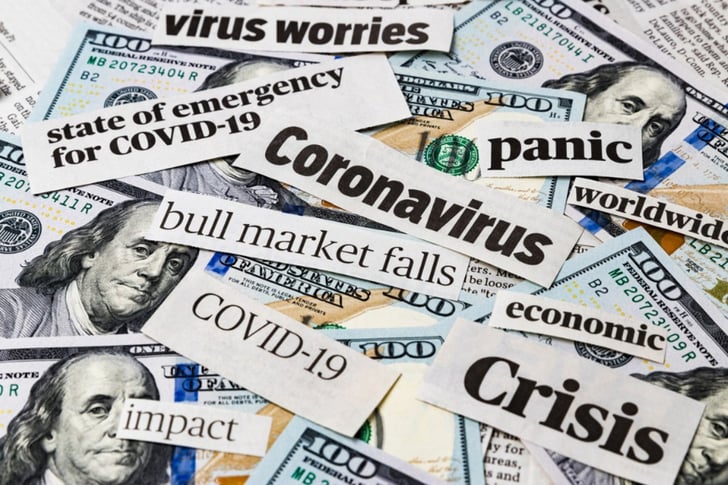Coronavirus Pandemic Layoff: What to do with your 401k

Social distancing, the stock market crash and many other factors brought on by the Coronavirus (COVID-19) crisis are impacting businesses around the country and many will not survive. Many business owners already face this reality.
For most people, a 401(k) through their employer is their only retirement savings. According to the Washington Post, unemployment rates are at 13%— worse than during the Great Depression — and they’re expected to rise. There is no doubt the pandemic has created many challenges for employers and employees, and that it will have a huge impact on retirement savings.
What will happen to your 401(k) if your employer doesn’t survive the economic downturn or if the business must lay off employees to survive? What will happen to your future retirement?
It’s hard to think about the future when there is so much going on that’s impacting your life today -- right now. However, you need to keep moving forward and not lose focus because the decisions you make today will have tremendous repercussions on your future.
Protecting your retirement savings is important and we want to help. Here’s an option you should consider to help preserve your retirement nest egg.
Take Control of Your Savings
If you were laid off or have an old employer's retirement plan (e.g. 401(k), 403(b), governmental 457 (b)), you can move these funds to an IRA without penalty.
Don’t leave your savings behind, exposed to market volatility and fees. Your plan has probably already taken a big loss, why continue to drain it? Consider doing a rollover to a self-directed IRA so you don’t fall behind on your retirement goals.
A self-directed IRA (SDIRA) gives you full control, allowing you to invest in assets outside the stock market, like real estate, private stock, precious metals, and other types of investments. You can invest in almost everything imaginable (except for collectibles and life insurance, see IRC 4975). However, the IRS does have a list of prohibited transactions.
Investments in self-directed IRAs grow tax-deferred or tax-free until withdrawal, just like brokerage IRAs. This means when your asset generates income or it’s sold, these profits are not taxed because they go back to the IRA. It is not until you start taking distributions at retirement (age 59 ½) that the income may be taxed, depending on the type of plan you have.
Conduct Due Diligence on the Custodian
In order to move your 401(k) savings to a self-directed IRA, you will need a self-directed IRA custodian, like IRAR Trust. Some financial institutions offer self-directed IRAs but do not allow alternative investments, nor have the flexibility that these custodians offer. A true self-directed IRA custodian allows investments in tangible assets, such as real estate. It does not offer investment products directly. You are responsible for researching and finding your own investments.
Make sure you conduct necessary due diligence about the company before opening an account. Fraud has become a major concern, with many scammers taking advantage of the crisis. Here is a tool to help you research custodians.
Doing a 401k Rollover to Self-Directed IRA
Once you have established a self-directed IRA you can rollover your 401(k) savings. Here are your rollover options:
Direct Rollover: Ask your plan administrator to make the payment directly to your IRA at your self-directed IRA custodian. Contact your plan administrator for instructions and forms to be completed.
The plan administrator will issue a check payable to the new self-directed IRA custodian for the benefit of (FBO) your account. In this case, no taxes will be withheld from your rollover amount. Here is an example of how the check will be payable: IRAR Trust FBO Your Name, Account #123445.
60-Day Rollover or Indirect Rollover: If the old 401(k) funds are paid directly to you, 20% in taxes will be withheld before you get the check. You must deposit these funds in your self-directed IRA within 60 days of receipt. Otherwise, it will count as a distribution.
For over 25 years, we have helped people like yourself with rollovers from 401(k) plans into self-directed IRAs. If you have questions regarding rollovers, we are happy to provide answers.
Investing outside the stock market
Once your self-directed account is fully funded, you are ready to make investments. Whether you are ready to start investing or just want to wait until things get back to normal, you have taken an important step toward your future by protecting your savings.
Your self-directed IRA allows much more investment freedom and potential for growth. Regardless of the size of your IRA, there are investment strategies focusing on assets that are known to have higher rates of return over time. Your IRA can partner with other IRAs to make an investment. It can even get a loan. We highly recommend you explore investing strategies to maximize your IRA’s potential.
In a nutshell
If you have a 401(k) and have been laid off, don’t leave your hard-earned retirement savings behind. Consider rolling over to a self-directed IRA for more investment options, helping you diversify your retirement portfolio with assets outside the stock market. Make sure you research the custodian and any investments for your IRA.
These are unprecedented times and a learning experience. Let’s not forget about the future because this will pass. We’re here to help, we’re here for you, and we will get through this together.








Comments (0)